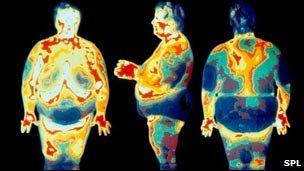More obesity surgery 'could save millions of pounds'
- Published

Surgery should be a last resort, says the government
Millions of pounds are lost in England by the failure of the NHS to provide more obesity operations, a study says.
About 1m people meet the criteria for bariatric surgery, but last year there were just 3,600 operations carried out.
The Office of Health Economics suggests £1.3bn could be saved over three years if a quarter of eligible patients got treatment through more people working and fewer demands on the NHS.
But the government said the treatment should always be a "last resort".
The economists looked at a range of data in their analysis, including official guidelines, figures from more than half of NHS trusts and previously published reports.
'Huge variation'
The research - which was funded by two firms involved in making equipment used in obesity surgery - suggests that one in four of the 1m eligible patients are ready for and want surgery.
If all those went under the knife, the report says, £1.7bn would be gained in working time while an extra £104m would be saved by the NHS not having to deal with the ill-health associated with being obese.
Once the £546m cost of the treatments is then taken into account, it claims, the saving stands at £1.3bn. The figure would be even greater if the saving made on benefits is taken into account, the authors add.
Even if this was not possible and only 5% got the treatment, £382m would be saved over three years, the report says.
Bariatric surgery covers a range of different procedures.
Gastric banding involves reducing the size of the stomach with a band fitted around it, while a gastric bypass reroutes food to a small stomach pouch created by surgeons.
A third, less frequently used procedure, removes a portion of the stomach.
While treatments have been increasing - in the past decade by ten times - there is a huge variation in what is offered by different NHS trusts.
The data obtained by the researchers found one in 10 ignored official guidance about who should be eligible for treatment, while half only used elements of this guidance.
It means that the numbers going under the knife vary from 192 in one trust to just one in another.
Often the situation is blamed on money, with obesity surgery being one of the first areas to be cut when money is tight.
Dr David Haslam of the National Obesity Forum, which commissioned the research along with the Royal College of Surgeons, said the government needed to improve access to treatment.
Peter Sedman, a leading bariatric surgeon and member of the Association of Laparoscopic Surgeons, added: "Surgery can literally transform people's lives in a way that no other treatment is able to, getting them back to work and contributing fully to society."
The Department of Health said bariatric surgery should always be a "last resort" and instead it was encouraging people to pursue healthier lifestyles so this type of treatment was not necessary.
But a spokeswoman added the NHS still had a duty to ensure patients had access to the right care.
"It is up to individual trusts to commission a range of services to meet their local community's needs."
- Published28 August 2010
- Published13 August 2010